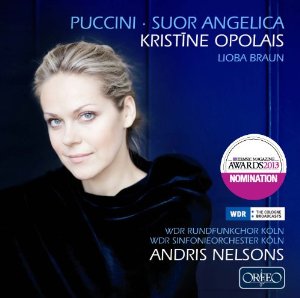I’ve always had a fondness for Giacomo Puccini’s Suor Angelica and apparently so did he, since he often referred to it as “among the finest of my children.” Not only does it boast an excellent libretto by Giovacchino Forzano but the superior craftsmanship of the composer in his later years leads to an abundance of melody and some very individual orchestral writing.
The story is of a young 17th century noblewoman forced to take the veil in shame after having borne a child out of wedlock. The highlight is a central duet in which the nunl’s aunt comes to divest her of her inheritance to increase her younger sister’s dowry. This exchange simmers on a low flame until the heroine righteously demands information about her child. Heart-breaking news leads to suicide and a supernatural conclusion that some find unconvincing if not downright mawkish. I, on the other hand, love it and it slays me everytime.
This piece’s Achilles heel, besides the fact that the Blessed Virgin makes a guest appearance in the opera’s final moments (spoiler), is that as theater it tends to be static, relying heavily on a soprano with near-miraculous dramatic and vocal gifts to bring it to life. We have had such sopranos and in their hands its like a Reader’s Digest mash-up of Parsifal and Song of Bernadette, only in Italian. It’s practically a radio play, which makes it perfect for recordings.
Since nearly every soprano willing to don a habit has had a crack at Puccini’s tragic nun it’s no surprise that the promising young Latvian soprano Kristine Opolais would be eager to throw her wimple into the ring. On this very atmospheric performance on the Orfeo label with the forces of the WDR Sinfonieorchester Köln she is joined by her husband, Andris Nelsons, at the helm.
His conducting, as recorded from concert performances in May and October of 2011 is nearly faultless. Nelsons has the gift to use Puccini’s architecture for the drama without bringing the attention onto himself, in contrast to some of his showier colleagues in the same repertoire. This is also by far the best engineered performance of this opera I’ve ever heard, which comes as no surprise considering the label.
The Cologne Symphony displays a gorgeous delicacy in the string writing pizzicatos. The piccolo bird calls in the opening are perfectly placed in the orchestral fabric as are all the other sounds of nature written into the orchestration. I especially like the slightly off center chimes used in the opening and closing which have a rustic sound to them. Volume levels are kept moderate so you can actually hear the orchestral opening without knob-fiddling, which doesn’t always happen.
I’d also like to point to a wonderful swell and fade on the single note the oboe plays as the nuns wait for the name of their sister who has a visitor. It adds an unusual amount of tension to the moment that’s normally a stand still and it took me by grateful surprise.
A fine supporting cast of singers seem to be have been chosen from mostly local talent. I won’t pretend that the interpreter of the chirpy Sister Genovieffa will make or break a performance but Mojca Erdmann is sweet voiced and true. Angelica’s aunt, the Zia Principessa, is a particularly favorite role of mine , here solidly sung by German mezzo-soprano Lioba Braun. In spite of what sounds like a solid diet of Wagner and Verdi in her bio, she sounds more Mistress Quickly than Erda. Oddly she does “qvesto” once or twice.
The young Ms. Opolais was recently well received at the Royal Opera as Butterfly and on DVD as Rusalka, Elvira in Don Giovanni and Tatiana in Evgeney Onegin. As a Puccini interpreter she has quite a bit going for herself. It’s a warm sizeable voice which has as its foundation what sounds like a very secure technique. She’s got the “vocal arc with the timed-release exploding high note followed the downward portamento” trick down cold.
The problem for me, and this is quibbling, is that she’s never, ever, off the voice. In the little exchange with Genovieffa when she’s asked if she has any earthly desires her answer,”Io? No…sorella no”. is sung completely straight where almost every other soprano gives her words the lie by using a more parlando approach.
Even the outburst where she finally confronts her Aunt is at most very solidly sung— hardly cold, but in a moment where some sopranos seem to heave their entire hearts into their mouths, Opolais remains slightly earthbound.
“Senza mamma” finds Opolais in very good form with excellent phrasing, breath to spare, and the tricky final note perfectly placed on a mezzo forte. In the finale she’s fearless on Puccini’s many top B’s and C’s.
So, high honors go to this set for the superior conducting and engineering and solid performances. After the heavens close back up at the end of the opera, Maestro Nelsons offers a loving version of Puccini’s Preludio Sinfonico as a bit of a balm.



